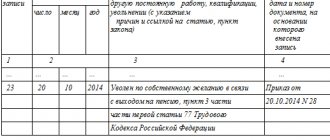We'll tell you how the dismissal process actually works, what rights an employer has, and what you can demand from an employee so as not to get problems from the labor inspectorate.
- How does dismissal happen?
- A working period of two weeks: what does it mean?
- Exceptions to the rules for dismissal at will
- How a manager resigns
- Dismissal under a fixed-term contract or from seasonal work
- Dismissal during the probationary period
- Dismissal for violation of labor duties
How does dismissal happen?
The basic rules for terminating an employment contract are set out in Chapter. 13 Labor Code of the Russian Federation. The general procedure for formalizing the termination of a contract is regulated by Art. 84.1 Labor Code of the Russian Federation. To fire an employee, you need to issue an order; you can use a template.
The date of termination of the contract is the last day of work, including in a situation where the employee was absent, but he retained his job.
On the day of dismissal, you are obliged to issue the employee a work book, and if this is not possible, send him a notice of the need to obtain the document. You also need to submit a certificate of income and a certificate of insurance experience, pay the employee and, if he wishes, issue him other documents, for example, information about his work activity. The date and reason for dismissal are entered into the work book, copying the wording from the Labor Code of the Russian Federation and making reference to a specific paragraph or part of the article.
These rules apply to all reasons for dismissal.
What does the manager write?
Issues related to the endorsement of documents, including those related to the termination of official legal relations, are regulated by Rosstandart Order No. 2004-st dated December 8, 2016, which put into effect GOST R 7.0.97-2016 “National Standard of the Russian Federation. System of standards on information, librarianship and publishing. Organizational and administrative documentation. Documentation requirements."
Gosstandart considers issues of affixing a permitting visa to documents, but applies to all resolutions of authorized officials of the enterprise.
According to the requirements contained in GOST R 7.0.97-2016, in the resolution on the application for termination of official legal relations, the responsible official must indicate:
- Full name, position of the person who is to carry out the instructions of the manager;
- the essence of the order;
- the period within which management's instructions must be executed;
- date and signature of the authorized person who signed the resolution (for example, a director).
When considering an application containing a request to terminate an employment agreement, the manager must affix a visa summarizing his attitude to the request contained in the document, including, for example:
- an order to implement the resolution to the HR department, accounting department or specific employees of these divisions of the company;
- the essence of the assignment is the preparation of documents related to dismissal, preparation of calculations;
- date of termination of the employment agreement;
- date of the resolution and signature of the head of the enterprise.
State standard GOST R 7.0.97-2016 allows you to affix a visa to the free field of the received document, on a special resolution form, by entering an order into the electronic document management system.
A working period of two weeks: what does it mean?
All possible grounds for termination of an employment contract are specified in Art. 77 Labor Code of the Russian Federation. Among others, there is dismissal at will - it is regulated by a separate article. 80 Labor Code of the Russian Federation. The period of 2 weeks is indicated in this article.
But to say that this is a work-out is incorrect. The code states that an employee can terminate the contract at his own request, but to do this he must notify the employer in writing at least 2 weeks in advance. The start of the period will be the day following the submission of the application.
This does not mean that a person must necessarily work the specified period. He can take vacation, time off or sick leave for this time - the deadline will run, the paid job must be saved, but in fact there is no work. If the vacation lasts more than two weeks, then the last day of work will be considered the last day of vacation. If an employee is on sick leave, but there is a letter of resignation, then he must be fired on the 14th day of sick leave.
10 examples of unusual dismissals and court decisions
In any of the 14 days before dismissal, the employee can withdraw his application. Then it is impossible to dismiss him at his own request without a repeated application.
How to write a resignation letter?
There are a number of rules that must be followed when drawing up a resignation letter:
- The application can be printed or handwritten on an A4 sheet.
- A header is filled in in the upper right corner of the sheet. Here the full name and position of the person to whom the application is addressed (usually the director) and the full name and position of the author of the application (employee) are indicated.
- Next, the title “statement” is indicated.
- After this, the text of the application is written in free form. Here you must indicate the reason for dismissal. When leaving at your own request with service, it is enough to write “at your own request.” It is also advisable to indicate the date of dismissal. When calculating it, you need to take into account the deadlines established in the Labor Code of the Russian Federation (see above). Please note: if the date is not specified, the employer will calculate it himself, and it may not coincide with the date you plan!
- After the main text, you need to indicate the date the application was drawn up and sign with a transcript. The application must be signed by hand!
Exceptions to the rules for dismissal at will
If an employee terminates an employment contract of his own free will, there are three reasons why he may not wait until the end of the two-week period. They are indicated in the same article. 80 Labor Code of the Russian Federation.
Agreement of the parties
If the employer does not mind, termination can be issued at the request of the employee earlier. Regulates the agreement process Art. 78 Labor Code of the Russian Federation.
There is no unified form of agreement between the parties - the employee and the employer draw up it in free form (sample agreement). But it is understood that the agreement means a peaceful order, that is, the parties agree on all the nuances of termination, including the timing of dismissal and the amount of compensation payments.
Inability to continue working
The Labor Code allows not to notify the employer two weeks in advance if the employee needs to resign due to enrollment in an educational organization or due to retirement.
Violations by the employer
In para. 3 tbsp. 80 of the Labor Code of the Russian Federation states that if an employer violates the norms of the Labor Code or the terms of the contract, then the employee has the right to resign at his own request without a two-week warning.
Convenient service for calculating salaries, sick leave and vacation pay, sending reports via the Internet
There is a nuance. In Art. 142 of the Labor Code of the Russian Federation specifies the procedure for an employee to act in case of non-payment of wages - if the employer delays it for more than 15 days, the employee can suspend work. If at the same time you submit an application for resignation of your own free will, and the downtime period lasts just more than two weeks, then you will actually not have to work out this period, the contract will be terminated.
How to quit while you are away from work?
The employer can terminate the contract if the employee submitted the application within the period established by Article 80 of the Labor Code, that is, two weeks before the actual termination of work, even if at this time the employee himself is absent from the workplace.
The restrictions apply exclusively to the dismissal of employees in their absence on the initiative of their superiors, which is regulated by Part 6 of Article 81 of the labor legislation.
The employee himself can resign at the time of his actual absence, even while on sick leave, on a business trip or on a planned vacation. It is important to note that the dismissal itself may be dated earlier than the end of the employee’s official absence from the place of work.
An absent employee can send his application by mail, indicating the date of dismissal. In this case, an employer who receives a letter later than the date of the desired dismissal must observe the following nuances:
- the dismissal order is registered with the current date;
- the order indicates an earlier date corresponding to that specified in the employee’s application;
- dismissal in this case will be legal if the letter arriving late is registered in the incoming correspondence journal - this is confirmed by the second part of the Labor Code article number 80.
Since the final settlement with the employee by the employer cannot be made on time, despite the absence of the latter’s fault, the employee will be paid compensation , which is regulated by Article 236 of the Labor Code.
But it is impossible to hold the employer liable for failure to issue a work book on time - this is confirmed by Articles 5.27 and 1.5 of the Code of Administrative Violations and Article 234 of the Labor Code.
Failure to show up for work without a valid, officially unconfirmed reason, that is, absenteeism, even after the employee submits a resignation letter on personal initiative, is grounds for dismissal, which is regulated by Article 81 of the Labor Code.
Dismissal under a fixed-term contract or from seasonal work
In Art. 292 of the Labor Code of the Russian Federation states that an employee with an employment contract for a period of up to two months (fixed-term contract) is obliged to notify the employer of the desire to end the relationship at least 3 calendar days in advance.
A fixed-term contract can be concluded not for a specific date, but on a condition - for example, while the employee whose job is being retained is absent. For example, this is done when it is necessary to replace the functions of an employee during maternity leave. The employee notifies the employer of his desire to resign 3 days in advance. If the employee returns, then the colleague replacing him does not need to work out anything - the employment contract is terminated on the same day.
Convenient tools for recording personnel events, generating orders and other documents
If the employment contract is concluded for seasonal work, the notice period is similar - 3 calendar days. They do this in writing. The process is regulated by Art. 296 Labor Code of the Russian Federation.
Dismissal during the probationary period
According to Art. 71 of the Labor Code of the Russian Federation, if the employee has not yet completed the probationary period, he can terminate his employment at will. To do this, he submits an application to the employer, even without a reason for dismissal. This must be done 3 calendar days before the date of termination of the contract. The basis for termination of the relationship will be “termination of the employment contract at the initiative of the employee.”
The employer can also terminate the contract. In this case, the employee must be warned about the unsatisfactory result of the probationary period. To do this, the employee is sent a notice indicating the reasons for non-compliance, no later than 3 days before the date of termination of the contract. The employee has the right to appeal the termination in court, so during the probationary period it is necessary to monitor possible problems in labor functions and discipline and record them using memos or acts.
The probationary period cannot last longer than three months, and for managers and their deputies of an organization or its separate divisions, branches and representative offices - no longer than six months.
Dismissal for violation of labor duties
If an employee does not want to wait two weeks, but writes a letter of resignation and simply stops going to work, then these actions are regarded as a gross violation of labor obligations, on the basis of Part 6 of Art. 81 Labor Code of the Russian Federation.
To terminate an employment contract, it is sufficient that the employee is absent from the workplace without a valid reason for more than four hours in a row. To prevent an employee from appealing your decision after dismissal, you need to collect witness testimony or otherwise prove his absence, and also send the employee a letter demanding to explain why he did not come to work.
The problem is that if it comes to dismissal for absenteeism, the employee is unlikely to agree to such a development. And he will be able to prove that he was absent for a good reason - for example, due to an emergency in the apartment, a visit to the doctor, an urgent call to school. An employee can try to challenge the termination of a contract for absenteeism, including through court.
As a result, the process will take longer than the 2 weeks specified in the law. Therefore, if an employee wants to leave of his own free will, but does not want to work, it is easier to let him go by agreement of the parties. Or if you are not ready to act peacefully, engage a labor law specialist to study the nuances of a specific situation.
Briefly about when an employee can quit without working
- The concept of “working off” is legally incorrect. The law obliges the employee, in case of voluntary dismissal, to give notice 2 weeks in advance. But this does not mean that he has to serve this term.
- You can go on sick leave or vacation for these 2 weeks.
- Or negotiate with management and resign by agreement of the parties.
- You still don’t have to work if you can’t continue working. For example, in connection with retirement or enrollment in an educational institution.
- There is no need to give 2 weeks notice of dismissal if the employer violates labor standards. When an employer does not pay wages for more than 15 days, the employee can suspend work and, in addition, apply for resignation. There is no need to work during downtime.
- There is an exception to the 2 week rule. For example, when a manager or deputy resigns, you need to give a month’s notice.
- If an employee quits during the probationary period, notice must be given 3 days in advance. A similar period applies in the case of a fixed-term contract or a contract for seasonal work.
- If an employee does not want to work for 2 weeks, he can simply not come to work. In this case, the employer has the right to try to fire him for absenteeism. But such a decision will be canceled if the employee provides valid reasons for absenteeism. Therefore, it is easier to negotiate or let the employee go without two weeks of work.
Briefly
- An employee can resign at his own request at any time by submitting a written notice. The employer's consent is not required. As a general rule, the deadline for submitting it is 2 weeks before the end of the work. It starts running from the date of application.
- Sick leave, vacation, material expenses of the employee, internal administrative procedures preceding dismissal do not increase this period.
- After 2 weeks, the citizen may not go to work.
- In case of refusal of dismissal, non-payment of final settlement amounts, failure to issue documents and a work book, a citizen has the right to apply to the labor inspectorate or court to protect his rights.








